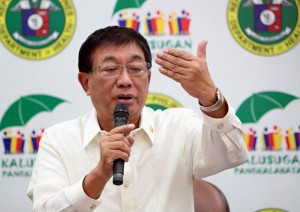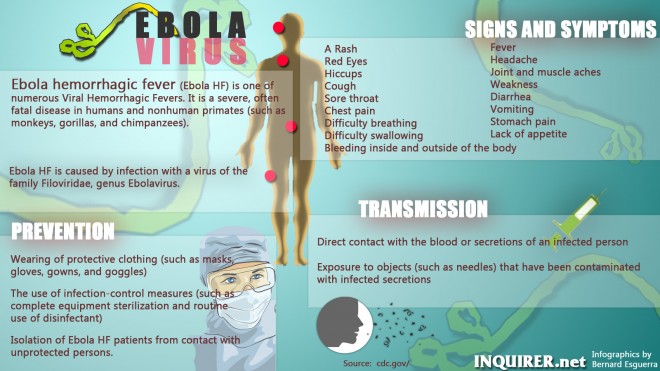PH has procedures to track, prevent Ebola spread — DOH
MANILA, Philippines — The deadly Ebola virus has reportedly infected some 1,200, mostly in West Africa where it has left at least 670 dead across the region since the start of the year.
The tropical disease also has no known cure, but Health Secretary Enrique Ona said on Thursday, “we should not worry about it.”
“At this point, what’s important is we’re aware there’s such a thing and we know the nature of the spread of the virus. It’s also good that we have all the necessary interventions to determine who are its possible carriers,” he told the Philippine Daily Inquirer.
Interviewed before a scheduled news conference at the DOH head office in Manila, Ona said the agency “has a game plan” on how to deal with the virus.
“Just like how we handled other viral infections in the past, we’ll make sure this time we’d able to monitor those who arrive in the country, particularly those from West African nations where the virus has reportedly spread,” he said.
Later in the media forum, he disclosed the DOH would coordinate with the Department of Labor and Employment to “find out how many overseas Filipino workers are based in those countries and other information about other Filipinos who are there.”
The health department also plans to work closely with the Bureau of Immigration and the Ninoy Aquino International Airport authorities in monitoring arrivals from Western African states.
“At the airports, we have our thermal scanning equipment to determine travelers who have fever and other symptoms of the infection,” said Ona.
At the same time, the DOH head disclosed that they had purchased “complete reagents to diagnose people” possibly infected with the virus.
“We have a capacity to make an early diagnosis of the virus,” he also said.
The agency will soon conduct “workshops about Ebola virus” among government doctors, nurses and other public health workers, according to Ona.
Ebola, which first emerged in 1976, is believed to be carried by animals hunted for meat, including bats.
The virus spreads among humans via bodily fluids and has reportedly killed 56 percent of those it has infected in the current outbreak.
West African countries like Liberia, Guinea, Nigeria and Sierra Leone are struggling to contain an epidemic that has infected some 1,200 people in the region.
Liberia alone has registered 129 deaths from Ebola, which causes severe fever and muscle pain, vomiting, diarrhea and, in the worst cases, organ failure and unstoppable bleeding.
The Liberian government banned public gatherings of any kind and announced quarantines of Ebola-hit communities.
Last week, authorities in Sierra Leone’s capital Freetown and Lagos in Nigeria announced their first cases, making an alarming new front in the fight against the disease mainly confined to remote villages and rural outposts, said an AFP report.
Meanwhile, Ona disputed claims by some groups that more than 47 percent of Filipinos had died without seeing a doctor.
“There’s no formal study that says this,” he said and wondered where the data came from.
He explained “it’s not true for the 2011 to 2014 period…My guess or estimate is about 25 percent. But that still needs validation.”
The DOH head asserted that contrary to some report, the Aquino administration has been “working to address the many health issues strategically and in a comprehensive manner with the end in view of developing an effective, responsive and sustainable health system” in the country.
The government, he said, was “ensuring that all Filipinos, especially the disadvantaged, have equitable access to affordable health care and a continuum of services with improved health governance.”
In a statement, Ona said “the triple increase in health budget since the start of the Aquino administration – from P25 billion in 2010 to P83.7 billion in 2014 – validates that health is a priority of President Aquino.”
The government, he also said, “has been creating an environment conducive for health by progressively increasing financial support, and aggressively pursuing policies like the RH (reproductive health) and Sin Tax and reforms of the National Health Insurance law,” among others.
“There’s more work to be done…(But) we can achieve our shared goals faster when we all work together,” he added.
RELATED STORIES

